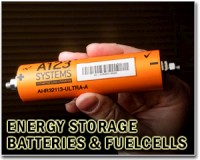 |
Uyuni, Bolivia (AFP) Oct 25, 2009 A dozen 600-liter barrels full of metal brine sit on a warehouse floor ready to be shipped abroad for analysis, the first step in Bolivia's quest to exploit vast lithium deposits in the sprawling Uyuni salt flats. Bolivia has half of the world's known reserves of lithium -- a key mineral used especially in rechargeable batteries, as well as everything from cell phones and laptops to electric cars. With demand for lithium expected to boom in coming years, Bolivia -- one of the poorest countries in South America -- is sitting on something potentially more valuable than a gold mine. The lithium is found in Uyuni, the largest salt flats in the world. Bolivian officials say there are 100 million tonnes of lithium under this desolate, 10,000 square kilometer (3,900 square mile) tourist attraction near the border with Chile, 3,650 meters (12,000 feet) above sea level. The state-run Bolivian Mining Corporation (Comibol) is sending the samples to the French Bollore Group, Japan's Sumitomo Corporation, and South Korea's Korea Resource Corporation (KORES) to study the mineral composition of the salt flats. Each barrel that leaves Uyuni contains lithium, along with potassium chloride, potassium sulphate, boric acid and magensium chloride, in different proportions which, in the initial stage, are obtained via evaporation. Under the tough salty surface there is an ocean of brine where the lithium is found. Miners reach the briny layer by drilling a hole and sinking a tube with an opening 15 centimeters (six inches) in diameter, five-200 meters (16-650 feet) below the salty surface. Officials say the Uyuni's natural beauty will not be harmed by the drilling because the holes are covered up once the brine is removed, heavy machinery flattens the site, and rain eventually erases all traces of human activity. Marcelo Castro, director of the state-run Lithium Pilot Plant, located on the southern edge of the salt flats, estimates there are a good 100 million tonnes of lithium at the site. Lithium extraction "is not only important for Bolivia because of the economic resources it will generate, but for the whole world, because being a source of clean energy it will help mitigate global warming," Castro told AFP. He will be in charge of getting the pilot plant, currently being built at a cost of six million dollars, up and running. Next year it is expected to produce some 40 tonnes a month of lithium carbonate, a compound used in medicine, the generation of energy, glass and construction materials. The government plans to sink 300 to 400 million dollars into the project's initial phase. Castro said that cost will be covered "100 percent" by the government. The second phase involving the production of lithium metal will require an 800-million-dollar investment which it is expected the Japanese, Korean and French concerns will back through investment and cooperation agreements. The final phase of the project calls for manufacturing lithium batteries, for which there is no dollar estimate but which necessarily will rely on foreign capital, technology and market outlets. Bollore and mining partner Eramet in September made a 1.2 billion dollar investment offer to carry out the project, including building a lithium battery factory. Despite all the foreign investment the lithium project requires, Bolivia said it expects to keep at least a 60 percent ownership. "The industrialization of these salt flats is strategic" in nature, said Comibol's mining expert Saul Villegas. "We want to develop a real, state-controlled industrial line that provides social and economic benefits to the country, not just high profits for foreign companies." Share This Article With Planet Earth
Related Links Powering The World in the 21st Century at Energy-Daily.com
 Toshiba launches portable fuel-cell for mobiles
Toshiba launches portable fuel-cell for mobilesTokyo (AFP) Oct 22, 2009 For people fed up with their mobile telephone or iPod batteries running out, Japan's Toshiba Corp. announced Thursday the launch of a portable fuel-cell that can power up digital gadgets on the move. With an injection of methanol, the fuel-cell generates electricity through a chemical reaction with oxygen to recharge mobile digital electronic devices via a USB cable. The high-tech giant ... read more |
|
| The content herein, unless otherwise known to be public domain, are Copyright 1995-2009 - SpaceDaily. AFP and UPI Wire Stories are copyright Agence France-Presse and United Press International. ESA Portal Reports are copyright European Space Agency. All NASA sourced material is public domain. Additional copyrights may apply in whole or part to other bona fide parties. Advertising does not imply endorsement,agreement or approval of any opinions, statements or information provided by SpaceDaily on any Web page published or hosted by SpaceDaily. Privacy Statement |